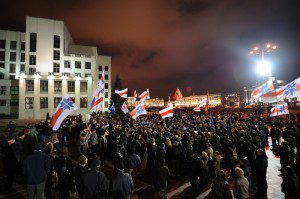5 Apr 2013 | Newswire
On 27 March, I attended Burmese comic Zarganar’s extraordinary show at People’s Park, one of Rangoon’s major public spaces. The elaborate production, broadcast on independent TV channel Sky Net, included dancing, music, and harsh and free-flowing satire throughout. The show featured comedians who went into exile following Zarganar’s arrest — for drawing attention the Burmese government’s lack of response to Cyclone Nargis — in 2008.
Watching the comics performing so freely on stage, it was extraordinary to think this would have been impossible only two years ago, when Zarganar was facing the very real possibility of spending the rest of his life in prison. His comeback was full-on and uncompromising.
The event took place against the backdrop of heightened tensions following violent clashes from between Buddhists and Muslims in Middle Burma that left 40 dead and at least 8,000 displaced. Tensions spread to Rangoon, and eventually Burmese authorities issued a ban on public gatherings and a partial curfew in three townships surrounding Rangoon.
I was in the offices of one of the many new journals that have started up since the abolition of pre-censorship for print media when we received news of the move. Some of the journalists and activists present were relieved, having felt unrest in the city, and one of the paper’s owners said that his staff who live in areas with high Muslim populations were afraid to go home. Some were even changing the locks on their doors.
Human Rights Watch has called upon Burmese authorities to help end violence against the country’s minority Muslims, and the United Nations has warned that the violence will only endanger Burma’s new wave of reforms.
On 1 April, private dailies returned to Burma once more; but on the same day, members of the newly independent media were not invited to cover the visit of the Singaporean president.
Artist Htein Lin summarised what it is like to be in Burma at such a crucial time, saying, “This is Burma: unstable one day, stable the next.”
Julia Farrington (Head of Arts, Index on Censorship) and artist Htein Lin are in Burma to deliver a symposium on artistic freedom of expression with Zarganar and his new company HOME (House of Media and Entertainment)
3 Apr 2013 | Newswire
Monday (1 April) heralded the return of private daily newspapers to Burma. Since the 1962 Printers and Publishers Registration Act the state has held highly restrictive powers to license newspapers and publishers creating one of the most hostile environments on earth for a free print media. Since the transition period of the past few years began, President Thein Sein has signalled that the government would liberalise restrictions on the media. Prior to the return of daily newspapers, privately-owned weekly journals had begun to flourish as demand for independent news markedly increased. On 1 February this year, the government launched the process to allow the independent media to bid for daily licenses.
Index on Censorship spoke to journalists and proprietors in Burma during a recent mission to the country in March. The return of independent daily newspapers has not been without incident. The government refused to grant licenses for daily publication to a number of publications including the Eleven Media Group, apparently because their application lacked an official revenue stamp valued at 100 kyats ($0.12). This decision was overturned in March and the group will launch its daily newspaper “The Daily Eleven” symbolically on World Press Freedom Day on May 3 according to AP.
Previously news was published in weekly journals that reviewed news and politics and had to submit all their proofs to the Press Scrutiny and Registration Division (PSRD) prior to publication (hence weekly publication). According to state journal the New Light of Myanmar, the termination of the PSRD was signed off at the cabinet meeting of 24 January 2013. Though ominously, the report claimed a new “Copyrights and Registration Division” would be formed under the Information and Public Relations Department.
Index on Censorship views the licensing of newspapers as an unwarranted restriction on freedom of the media. The registration process for daily newspapers in Burma has been particularly restrictive with the application requiring a code of practice, a code of ethics and a code of conduct for the publication — even though the Press Council is working on a series of ethical codes for journalists as part of its on-going negotiations to draft a more proportionate press law.
One editor told Index he had applied for a press license on 21 February and had not yet heard of the result by 13 March. The application was over 80 pages in total and the local authorities stated the application needed to be in both Burmese and English. Journalists told Index several questions on the application for a daily newspaper license concerned the previous political activities of the applicant, which raised concerns that political considerations will be taken into account when awarding the limited number of licenses proposed.
Further advances in media freedom are expected in the coming months, with foreign journalists to be given working visas from mid-April (rather than taking the risk of a tourist visa as is the norm now) and the BBC hoping to broadcast its global news channel in Burma later this year. Reporters Without Borders has moved Burma’s ranking in its Press Freedom Index up 18 places to 151 out of 179 countries.
Yet, old habits die hard. On the first day of new daily newspapers, the government kept the independent media at arm’s length from an official state visit by the President of Singapore Tony Tan Keng Yam with only the official state media allowed into the press conference surrounding the trip. A forthcoming Index report into the state of freedom of expression in Burma will examine these trends in further detail.
28 Mar 2013 | Bahrain Statements, Middle East and North Africa

Nabeel Rajab, BCHR – winner of Bindmans Award for Advocacy at the Index Freedom of Expression Awards 2012
Index on Censorship has called upon the Bahraini government to release 2012 Index Freedom of Expression Award winner Nabeel Rajab and other prisoners of conscience, and honour its promises to uphold freedom of expression.
Index’s Chief Executive Kirsty Hughes said:
“The continued imprisonment of Nabeel Rajab and other activists shows that Bahrain is not serious about reform. The targeting of human rights activists and imprisonment of prisoners of conscience shows that government commitments to reform are for now meaningless.
“Index calls on the Bahrain government to respect the right to peaceful protest and the right to free speech, to end its violations of these rights and to implement fully the recommendations of the Bahrain Independent Commission for Inquiry (BICI).”
According to the Project on Middle East Democracy, the government of Bahrain has only succeeded in fully implementing three of the 26 recommendations made by the Bahrain Independent Commission for Inquiry (BICI) report in November 2011.
Members of the Bahrain Centre for Human Rights (BCHR) have faced repression from Bahrain’s regime for their tireless work documenting human rights violations committed by the government, since popular protests began on 14 February 2011. According to BCHR, there have been 89 deaths since the start of the country’s uprising.
In March 2012, accepting the Index on Censorship Advocacy award on behalf of BCHR, human rights activist Nabeel Rajab said that the international community heard little about uprisings in Bahrain because “we have oil”. He is currently serving a two-year sentence for organising so-called “illegal gatherings”. The founder of BCHR, Abdulhadi Alkhawaja, is on hunger-strike to protest his ill-treatment in prison. Alkhawaja is currently serving a life sentence for allegedly plotting to overthrow the ruling regime. His daughter Zainab is also on hunger strike and serving a three-month jail sentence.
In April, international attention will once again turn to Bahrain when it hosts the Formula 1 Grand Prix. Last year, the Bahraini government attempted to use the race to gain positive international attention while continuing to clamp down on protesters who are critical of the regime.
4 Mar 2013 | Campaigns, Europe and Central Asia, News

Opposition protesters in Minsk in 2010. Kseniya Avimova | Demotix
Europe’s last dictatorship plans even tighter controls over citizens’ access to the digital world, Index shows in a new report (more…)


